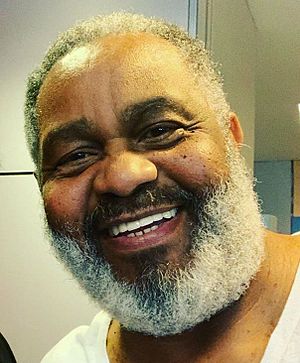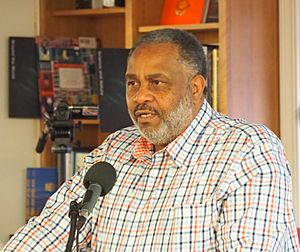Anthony Ray Hinton facts for kids
Quick facts for kids
Anthony Ray Hinton
|
|
|---|---|

Hinton in 2019
|
|
| Born | June 1, 1956 Alabama, U.S.
|
| Occupation | Author Activist |
| Known for | Being wrongfully convicted of murder; criminal justice reform and anti-death penalty activism |
|
Notable work
|
The Sun Does Shine: How I Found Life and Freedom on Death Row |
| Criminal status | Exonerated |
| Conviction(s) | Capital murder (2 counts; overturned) |
| Criminal penalty | Death (overturned) |
| Spouse(s) | Halimah Abdullah |
Anthony Ray Hinton (born June 1, 1956) is an American author and activist who was wrongly accused and convicted of two murders in 1985. He was sentenced to death and spent 28 years in a special part of prison called death row. In 2015, he was finally set free after proving his innocence.
The Supreme Court of the United States reviewed his case in 2014. They found that the main evidence used against him, which was about a gun, was not reliable. After the state of Alabama could not prove he was guilty, all charges were dropped.
After his release, Hinton wrote a book about his experience called The Sun Does Shine: How I Found Life and Freedom on Death Row. His story was also part of the 2019 movie Just Mercy, where he was played by actor O'Shea Jackson Jr..
Contents
A Terrible Mistake
In 1985, two fast-food restaurant managers were killed during robberies in Birmingham, Alabama. A survivor from a third robbery identified a picture of Anthony Ray Hinton, who was 29 years old at the time.
Police arrested Hinton, even though he was at his job at a supermarket warehouse when the crimes happened. He lived with his mother, Buhlar Hinton, in a small town near Birmingham.
Unfair Treatment
From the beginning, Hinton was treated unfairly. A detective told him that it didn't matter if he was innocent. He said Hinton would be convicted because he was Black and the judge, jury, and prosecutor would all be white.
Hinton was given a lawyer by the state who did not do a good job of defending him. The lawyer hired a science expert to look at the evidence, but the expert had poor eyesight and little experience. The jury did not believe the expert's testimony. They also ignored Hinton's boss, who told the court that Hinton was at work during the robberies.
The only evidence the prosecution had was a claim that bullets from the crime scenes matched a gun found at Hinton's mother's house. There was no other proof, like fingerprints or witnesses, connecting Hinton to the crimes. Based on this weak evidence, Hinton was found guilty and sentenced to death.
Life in Prison
Hinton was sent to death row at Holman Correctional Facility. He had to live in a small cell by himself for almost 30 years. His mother, Buhlar, and his best friend, Lester Bailey, always believed he was innocent and supported him. Sadly, his mother passed away in 2002 while he was still in prison.
To cope with his difficult situation, Hinton started a book club with other men on death row. They read and discussed books by authors like James Baldwin and Harper Lee. Reading helped them feel a sense of escape. Over the years, 54 men from his prison block were executed. The electric chair, nicknamed Yellow Mama, was so close to his cell that he could smell it when it was used. Eventually, Hinton was the only member of his original book club left.
The Fight for Freedom
For years, Hinton and his lawyers fought to prove his innocence. His first lawyer was not successful. Later, a non-profit group called the Equal Justice Initiative (EJI), led by lawyer Bryan Stevenson, took over his case. They worked for 16 years to free him.
EJI hired three new experts to examine the bullets. All of them, including an expert from the FBI, agreed that the bullets did not come from the gun found at Hinton's mother's house. Even with this new proof, the Alabama courts refused to give him a new trial.
Finally, in 2014, the case reached the Supreme Court of the United States, the highest court in the country. The Supreme Court ruled that Hinton's original lawyer had done a very poor job and had not defended him properly. They said he deserved a new trial.
Freedom and a New Purpose
On April 1, 2015, prosecutors in Alabama admitted they could not prove the bullets matched the gun. Since this was their only evidence, they dropped all the charges against Hinton. Two days later, on April 3, 2015, Anthony Ray Hinton walked out of prison as a free man.
Hinton was the 152nd person in the United States to be freed from death row after being proven innocent. Upon his release, he said, "Everybody that played a part in sending me to death row, you will answer to God."
Since being freed, Hinton has traveled the country sharing his story. He speaks out against the death penalty and works for justice reform to prevent what happened to him from happening to others. His book, The Sun Does Shine, has received many positive reviews for its powerful story of hope and forgiveness.
Hinton has been recognized for his strength and courage. In 2019, he received an honorary doctorate degree from St. Bonaventure University. He also received an honorary degree from Emory University in 2023. Although the state of Alabama has a program to pay people who were wrongly imprisoned, Hinton has not received any money from the state.
See also
- Capital punishment in the United States
- List of wrongful convictions in the United States
 | DeHart Hubbard |
 | Wilma Rudolph |
 | Jesse Owens |
 | Jackie Joyner-Kersee |
 | Major Taylor |


